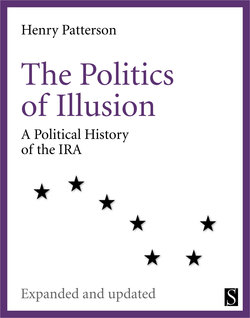Читать книгу The Politics of Illusion - Henry Patterson - Страница 14
На сайте Литреса книга снята с продажи.
4 A Limited Reassessment: The IRA after 1962
ОглавлениеIn June 1963 an incident occurred in Belfast which epitomised the contradictory impulses at the heart of republicanism as it sought to recover from the failure of the border campaign. A march was to be held to celebrate the 200th anniversary of Wolfe Tone’s birth. It was part of a series of activities organised by the Wolfe Tone Society, which had emerged from discussions between Cathal Goulding, Seán Cronin and Dick Roche in Dublin and a small group of republicans, nationalists and labourites there and in Belfast.243 In Belfast, the urge behind the Wolfe Tone Society – to create a broad coalition of ‘progressive’ and ‘nationally-minded’ forces – ran up against the brutal wall of communal assertiveness. The Belfast IRA had been asked to act as a colour party, but when the police forbade the carrying of an Irish tricolour, the IRA commander in Belfast, Billy McKee, assented. This decision was bitterly contested by the bulk of Belfast IRA men and, despite Goulding’s attempt to mediate, McKee was forced to resign and was replaced by Billy McMillen. A march inspired by a strategy apparently aimed at building a new ‘anti-imperialist’ alliance to include at least a section of the Protestant community would in fact herald a period of intensifying conflict between the police and republicans on an issue that could reinvigorate communal solidarity amongst Catholics but left even progressive Protestants cold.244
Goulding was now Chief of Staff of the IRA, his reputation for leftism notwithstanding. Imprisonment in England during the first three years of the border campaign meant that he was untainted by its failure and, in any case, the general demoralisation was such that no one else wanted the job.245 The Army Convention in 1962, at which his tenure commenced, marked the beginning of a process of assessment of the state of the IRA and a reassessment of the history of the republican movement. For Goulding, such a reassessment meant, in part, a return to the debates of the inter-war period, with the aim of reconstituting the IRA as a vanguard of social republicanism. It was in this context that he made overtures to intellectuals outside the IRA. The nature of this external input has been the subject of bitter controversy, but little useful information or analysis has been forthcoming. The split in the IRA and Sinn Féin in 1969-70 would see Goulding’s opponents claim that he had allowed ‘Marxists’ to take effective strategic direction of the republican movement. These claims have been somewhat uncritically repeated in Bishop and Mallie’s history of the Provisionals.246 What was the significance of these external influences?
The two key individuals involved in this process were Anthony Coughlan and Roy Johnston. Both had lived in England and been involved there in the activities of the Connolly Association, which had emerged from the disintegrating Republican Congress. A London branch reconstituted itself as a Connolly Club, and this was subsequently revived by an influx of Irish International Brigaders.247 Its monthly paper, the Irish Democrat, had been edited since 1947 by Desmond Greaves, a member of the Communist Party of Great Britain and author of a major, if tendentious, biography of Connolly.248 Under his leadership the Connolly Association concentrated on organising among Irish emigrants with two principal aims: ‘first their own defence, second the freedom of their country’.249 It also sought to influence the British labour movement away from what was seen as its dangerous mixture of apathy and pro-Unionism on the Irish question.
During the border campaign the Connolly Association concentrated on attacking the Unionist government for interning republicans and began to press the British government to use its power under the Government of Ireland Act to legislate for civil rights in Northern Ireland.250 As early as 1955, the Irish Democrat had put forward the idea of a civil rights campaign as the way to shatter Ulster Unionism.251 For a year in 1960-61 Coughlan acted as a full-time organiser for the Connolly Association, promoting ‘anti-Unionist political activity in Britain’,252 including a march from London to Birmingham to raise the issue of British acquiescence in Unionist rule.253 A graduate of University College, Cork, who had been in London from 1958 doing post-graduate work, Coughlan returned to a lectureship in social administration in Trinity College, Dublin, in 1961. He was a fervent republican in the sense that he saw the central issue of Irish politics as the completion of the national revolution. He believed, however, that this could not be achieved by the physical force tradition but only by the creation of a broad national coalition in which the labour movement would play a central role. The objective of this movement was ‘real’ independence, not socialism. In Northern Ireland the objective would be to destabilise Unionism by reforms which would detach enough Protestants from the Unionist Party to create a ‘progressive’ coalition: ‘Stormont could then be used against imperialism,’ to quote Greaves, his friend and mentor.254
Coughlan was invited to join the Wolfe Tone Society in 1964, when it was decided to maintain it as a permanent ‘think tank’ of ‘active people with roots in the language, trade union, co-operative, republican and other organisations’.255 The Wolfe Tone Society was to provide the intellectual resources for a unification of ‘the bulk of the radical-minded elements in the existing trade union and republican movement’ in a new revolutionary political organisation.256 Goulding and Cronin had played a role in initiating the Wolfe Tone Society, but its subsequent development was not heavily influenced by the IRA. In fact, the IRA was undergoing a parallel process of development in which some of the central ideas propagated by the Wolfe Tone Society were to play a crucial if controversial role.
